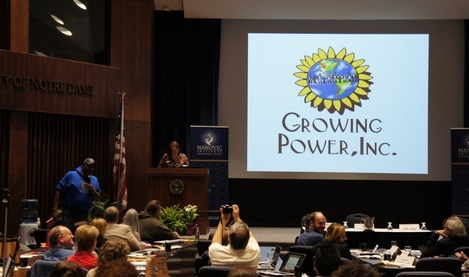
"Agrarian urbanism" was another great concept of the day, put forward by Notre Dame Architecture Professor Lucien Steil. Steil had more pithy insights for us. "Small urbanism" is the transition citizens may choose to take to convert lawns to gardens. Getting control of our food system means "integrating production and consumption" and locally-produced food is the way to do that, said Steil. He also encouraged participants to develop small steps, "micro-projects," to change the food system in our communities. "Change happens best that way," Steil said.
Chef Joho, from the Alsace region of France and owner of Everest in Chicago, told participants that "now is the time to re-educate our communities on what we are supposed to be eating." The sources are here for local food, and chefs need to look for them, he said. Joho's core message: "Eat what you know."
"Prinzessinnengarten" was an inspiring model based in Berlin shared by Elizabeth Luning. Her platform, UniGrowCity, has built a social enterprise in Berlin comprising 20,000 square feet of growing space with community gardens accessible to the city's large migrant population. Food literacy, conservation, and strong neighborhood identity are terrific outcomes of their outreach and mission.
Much food for thought -- and action -- resulted from our participation. Many thanks to the Nanovic Institute for organizing such a terrific workshop and for their interest in continuing to engage with the community and local producers such as Green Bridge around the topic of urban sustainable food systems.
 RSS Feed
RSS Feed
